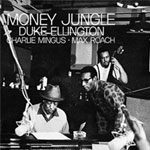Son Volt American Central Dust Rounder
- Performance:

- Sound:

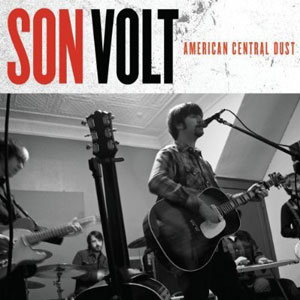
At this point, I’m not expecting Son Volt to release any experimental electro-pop or klezmer-inflected jam funk. Son Volt makes straight ahead country tinged rock and roll music. Almost exclusively. Jay Farrar has the voice for it. He’s good at it. He’s known how to do it for decades, and he doesn’t seem to have any interest in changing his ways this late in the game. Besides, Farrar got a little risky with some alternate tunings and unorthodox song structures on some solo releases a while back, and no one was buying. I thought Son Volt might take over the world after “Trace” in 1995, but they continue to fly under the radar almost fifteen years later. They’ve never challenged their fans in any way other than when they went on hiatus for the first half of this decade. They’ve released a studio album every other year since re-forming (with a new lineup) in 2005. The most recent is “American Central Dust,” and it’s everything you’ve come to expect from Son Volt, and not much more.
Farrar seems to be pre-disposed to melancholy and rumination. Again, that’s no profound statement if you’re at all familiar with this band’s work. Sometimes he seems to get weighted down with what seems like an overly weary world view, but it works well for those of us that share in his tendency towards pathos. I’m going to get a lot of mileage out of “American Central Dust,” but I won’t go to any Son Volt shows expecting to see a new crop of young kids in skinny jeans on date night in the crowd. This is the same music for the same fans that have been with this band from the beginning. And, as a general rule, we’re a little older and more frazzled, and “American Central Dust” plays to this faction more directly than either of the band’s prior two releases. There’s not one single rocker in the bunch. Certainly nothing along the lines of “Drown” or “Straightface” from the ’90’s. There’s nothing even as lively as “Who” or “Bandages and Scars” from 2005’s “Okemah and the Melody of Riot.”  We get a lot of Farrar’s patented mid-tempo acoustic rock accented with lap steel and pretty piano parts. His voice, as always, is front and center in the mix. Why wouldn’t it be? It’s instantly recognizable and stronger than ever. Andrew Duplantis provides some tasty vocal harmonies as he has since the aforementioned “Okemah” record, and the band rounds out their sound on “American Central” with some fiddle (which I don’t recall hearing on an official Son Volt release in the last few years) and accordion. “Down to the Wire” is the first single and it might get the festival crowds moving this year while they wait for the headliner’s set, but I suspect they’ll spend more time talking about their plans for Burning Man than rushing the stage for a copy of Farrar’s handwritten setlist. (Note: the last sentence is hyperbolic. I don’t know that Son Volt is scheduled at any of the summer festivals or how many festivals this summer even has left. Call, as they say, before you haul.)
So, “American Central Dust” is another solid, if not overwhelming effort, from one of America’s greatest purveyors of roots rock (or Americana, or whatever descriptive term meaning “authentic” that you’d like to apply). The band doesn’t seem to have gone to any great lengths to provide us with a top-tier vinyl experience either, especially in comparison to 2007’s “On Chant and Strum.” This is a single record on ordinary vinyl with no liner notes save the band info printed on the back cover. There’s no digital copy so you can’t take it with you, and I’m actually okay with that for this release. This music sounds best on vinyl. There’s nothing digital about it. In fact, that’s one of my favorite things about “American Central Dust.”
Merle Haggard and the Strangers Mama Tried Capitol
- Performance:

- Sound:

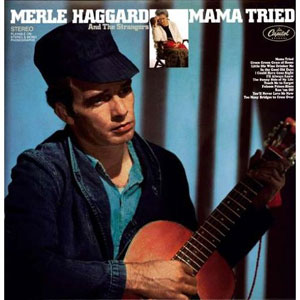
I heard Merle Haggard’s classic “Mama Tried” by the Grateful Dead long before I heard the original version. This isn’t something I’m proud of, but I suspect that I share this affliction with others. And, really, you could do a lot worse for Grateful Dead perfomances. “Mama Tried” is a true American classic in every sense of the word. Even Bob Weir’s vocal warblings couldn’t ruin it. But to hear Merle Haggard sing it is to hear bona fide country music. No filter required. And if you like that, then you like the full length album too. “Mama Tried,” by Merle Haggard and the Strangers, was released three years into a recording career that started in 1966. These songs hold up forty plus years later for a variety of reasons, chief among them superior songwriting and raw talent. We’ve all heard the jokes about what you get when you play a country record backwards, but people relate to the messages in songs about cheating, and heartbreak, and drinking, and getting in trouble. That’s why there are enough of them to warrant the joke. And whereas “hot new country” music relies heavily on extravagant production and marketing techniques designed to make your head explode, “Mama Tried” is carried by the talents of six musicians and a producer with the good sense to stay out of the way. You get signs of life in country music these days, but you’ve got to dig for it. I could listen to country records from the “Mama Tried” era all day without pause and I’d be happy to do it.
Country already had classics when “Mama Tried” was released and it wasn’t uncommon for singers of the day to interpret current hits either. Therefore, you get Haggard’s take on “Fulsom Prison Blues” mixed in with “Green Green Grass Of Home.” Haggard’s no slouch with a pen either. His “I’ll Always Know” fits in perfectly amongst the classics. Dolly Parton and Mel Tillis have writing credits on “Mama” too so you start to get a picture of the kind of record I’m talking about. Merle’s voice is like jalapeno honey. It’s sweet and thick, but it’s been burned and can burn some too. Put that in front of the traditional country line-up: drums, piano, steel guitar, lead guitar, and bass, and you’ve got something timeless. I’ll never understand how we got this far from the truth in country music, but we did. “Mama Tried” sounds completely foreign to Toby Keith fans as a result. Trust me, I’ve tried to help these people. Hot new country fans think that real country music is funny. They ridicule it without seeming to realize that their favorite genre is just a cancerous mutation of it. The beauty and simplicity of true country music holds no value to them. It’s a direct parallel with the thinking in hip-hop. Fans of Eminem would typically not think to explore Kurtis Blow’s catalog unless Eminem came right out and told them to. And I think they’d have the same reaction that new country fans often have to real country. It’s somewhere in the neighborhood of complete disregard. I don’t understand it, but I don’t fight it anymore either. Sometimes you just have to cut bait…
“Mama Tried” was recently re-issued by Capitol Records on 180-gram vinyl with original packaging. I mistakenly thought it was part of Universal Music Group’s “Back to Black” series which would have been great as there would have been a nicer inner sleeve and a digital download coupon. The original packaging consists of almost nothing save for an essay by a DJ from Iowa on the back cover. It’s an amusing slice of life from a mid-60’s “hepcat” talking about how much he digs Merle’s (then) new record and how much he likes to drink and sing while listening to it. So there you have it. I guess in some ways things haven’t changed that much for country music after all.
Van Morrison Astral Weeks Live At The Hollywood Bowl Listen To The Lion Records
- Performance:

- Sound:

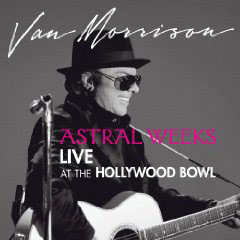
I almost bought a plane ticket to Los Angeles when I first heard that Van Morrison was going to perform his classic album, “Astral Weeks,” in it’s entirety at the Hollywood Bowl in November of 2008. I didn’t because I couldn’t muster the energy to navigate such an enormous town that I’m so unfamiliar with on that weekend. Nor did I buy a train ticket to Berkeley to see him do it at the Greek Theater a few months ago. The tickets were pricey and it was rainy out. I dropped the ball on both occasions, and the vinyl version of “Astral Weeks Live At The Hollywood Bowl” has caused me to regret it ever since.
The most obvious difference between the original studio version and the newer live version is that Morrison didn’t perform these songs in order. At least, these songs weren’t sequenced in order on the live release. The second most obvious difference is that the live release involves electric amplification. There’s still plenty of acoustic instrumentation, but the instruments had to be amplified for the venue, and therefore the recording is nowhere nearly as intimate as the original studio version. That’s not surprising. Van Morrison would have to perform the album for you in your living room in order to achieve that level of intimacy. That seems unlikely at this juncture so I accept “Live” as a fair approximation of what that might sound like. Improvisation is the rule on both versions with the live “jams” being more expansive and energetic by nature. Morrison uses his voice as an instrument more so than almost anyone else I can think of. He doesn’t let details like sensible words get in the way of a moment either. If there’s no coherent meaning to express the emotion he’s feeling, he just scats. I’m allergic to scatting as a general rule. It makes me think of Al Jarreau when I’d rather think of almost anything else. But I listen when Van Morrison scats and it sounds like a saxophone. He feels it, folks. Don’t doubt that. There’s no way you could attempt to do the things Van Morrison does vocally and still worry about sounding cool. You’d have to be willing to get “out there” and to not worry about how silly you sound getting there. This impulse expresses itself through his guitar playing too. He gets a little spastic with the rhythm when it’s required, and it all works in the name of jazz. I’ve only seen the man play live once. I’d intended to keep it that way as he’s known for phoning it in (or worse) on occasion and there’s no way to predict which performer might show up on a given night. The good one showed on the night I went. The one that sings like a man possessed. The one that plays sax, and guitar, and harmonica with equal abandon. It sounds like this is the guy that showed at the Hollywood Bowl recordings too. The performance is tight and focused which is remarkable given the previously mentioned improvisatory nature of “Astral Weeks.” I’d have sat in the rain for three performances straight if I’d have known then what I know now.
The vinyl version of “Astral Weeks Live” is a pretty heady experience. It’s two heavy records in a gatefold package with performer credits and a couple of live shots. But the sound is what makes it so special. It’s like slipping into a bubble bath and when the bubbles burst they make beautiful acoustic noises that remind you of some really pleasant dream you used to have all the time. Who knows why Van Morrison chose to re-visit this specific album after so many years? He’d have made more of a splash with “Moondance” live. And I don’t mean to take anything away from that one, but I’m glad he chose “Astral” instead. The material is so rich and so open to interpretation and exploration. It’s perfect, really. I think I’ll go buy the recent high-quality re-issue of the original too. I can’t think of a better album to explore more closely on a quiet weekend. The vinyl version of the live work is topped off with a few non-“Astral” tracks for good measure. “Listen to the Lion” is nice enough, but “Gloria” is like a welcome rowdy guest at an otherwise docile party. It doesn’t feel out of place at all and I imagine it made for a pretty stellar encore at the Hollywood Bowl. I’d have been ecstatic. I won’t miss it again if I get another shot. I’m promising myself that right now…
Wilco Wilco (the album) Nonesuch
- Performance:

- Sound:


The first thing I noticed about Wilco’s latest was that the packaging is perfect. They thought of everything on this one. It’s a single, heavy record with a pristine pressing. The lyrics are printed inside the gatefold. The inner sleeve is of the high-quality rice paper variety, and – get this – they included an empty glossy paper inner sleeve with photographic artwork on it so that you don’t get cheated by the plainness of the rice paper sleeve! And, of course, they included a CD of the entire work so that you have a digital copy to play for all of your Wilco-obsessed friends at whatever venue you choose. This is a vinyl release by an obvious vinyl fanatic, and I am ecstatic to see that someone finally got it right. All the way right. Hallelujah.
Unfortunately, the music on “Wilco (the album)” is not amongst my favorite that the band has released. That’s not to say that it’s bad. Maybe it’s not fair to hold the band’s work up against their previous recordings since their sound has changed so dramatically over the years. But that’s exactly what I’m doing. Up until now, the quality of their recorded work has more or less improved per release according to my opinion. (Wilco fans are ravenous creatures, and they’re very opinionated, and they take all this as very serious business. The “best Wilco album debate” could rage unchecked for ions if we got enough of their supporters involved, I’m sure. But this is my review, and I have to say that it feels a little bit like these are outtakes from their previous effort, “Sky Blue Sky,” to me.) As always, there are sublime moments within these grooves. “Wilco (the song)” is a fun little comic number about the healing power of music and it’s a rocker, but I’m still more interested in the fact that they reference their own band name in their own song (anyone remember Big Country?) than I am in the actual sound. The real stand-out track, for me, is “Bull Black Nova” with it’s paranoid piano plinking, and schizophrenic murder imagery. It’s a tense piece of work and the resolution doesn’t really count as resolution at all. But the experience that I have while listening to “Wilco” is not necessarily dictated by the quality of the music. I find myself wondering about their influences (ELO? George Harrison? The Doors?) I can’t decide if “You Never Know” is as rocking as I think it is on record or if I have heavenly memories of seeing them perform it live a couple of times just prior to the record’s release. Basically, I get caught up with other aspects of the aural experience more so than the actual songs.
There are plenty of musical moments that are worthy of mention too – don’t get me wrong. Glenn Kotche builds “One Wing” from a quiet folk tune into a galloping rocker on the strength of his drumming alone. “I’ll Fight” builds plenty of momentum inside its four minutes and thirty seconds too, mostly through Jeff Tweedy’s celebrated and well-documented lyrical prowess. The current incarnation of this band has been together for a few years now, and they know how to play to their strengths at this point. I doubt that they’re ever going to release something that’s outright bad. Personally, I’d like to see them get back to some of the more experimental work that’s kept their fans and record labels so off-balance over the course of their career. This one’s a little quiet for my taste, and I’m hesitant to embrace that aspect of their sound so fully when I know how proficient they can be come rocking time. I’ll get plenty of enjoyment from hearing this record, but I really look at it as a way to hold me over until their next full length release. Bring it on, gentlemen. I know you can…
The Dead Weather Horehound Third Man Records
- Performance:

- Sound:

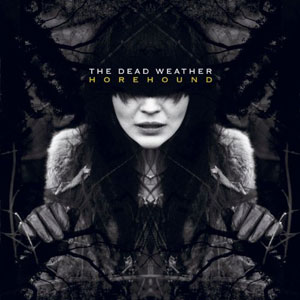
You can tell evil forces are at play with one glance at the cover of the Dead Weather’s debut album, “Horehound.” The cover photo suggests something ungodly and “witchy” while the black & white band photo inside the gatefold shows a leering Jack White covering lead-singer Alison Mosshart’s mouth while his two other band mates stand idly by. They’re not even letting on that they recognize the super hero standing next to them. You see, the Dead Weather is Jack White’s newest revelation, & this time he’s just the drummer. The low-down, nasty, leering drummer. He’s handed the guitar duties off to Dean Fertita (Queens of the Stone Age) who carries that load quite nicely, thank you, while Jack Lawrence (from White’s “other” side project, The Raconteurs) holds down the bass. This outfit makes crunchy riff-rock, & it fits well with the artwork’s visually violent themes.
The band seems to reinforce their barbarous intentions with song titles like “Hang You From The Heavens,” & “So Far From Your Weapon.” “I Cut Like A Buffalo” is a particularly belligerent little number wherein White asks, “Is that you choking?” He does this over & over. Gleefully. Dylan’s “New Pony” sounds like some sort of militaristic-Zeppelin-monster through the Dead Weather’s filter, but somehow it all sounds playful – even when Mosshart sings about building a house for your bones. Her voice is as dangerous and seductive as any film-noir vixen, and it feels like you’re risking something to hear her sing.
There are a lot of really fun moments on this record, all dangerous posturing aside. There are some programmed beats, & Pink Floyd atmospherics. Hip-hop inflections & heroic guitar parts. It’s a quick listen too. It’s actually a three-sided release with an etching of the cover art on side four so it feels a little like a hit and run. White’s the producer so you could safely guess that the record sounds undiluted and impure. His drumming sounds like a factory machine warming up or breaking down in perfect time. I’m sure he had a blast outside the main spotlight during the making of “Horehound,” but what he really seems to enjoy most is antagonizing the hell out of Alison Mosshart. I mean, for crying out loud, the video for “Treat Me Like Your Mother” shows the two of them strolling towards each other on the beach emptying round after round from their automatic rifles into each other.
There’s a lot of theater and mystery involved with this release, right down to the stenciled messages in the lead out section of the records themselves. That’s the only way of discerning side one from side two. My copy also says, “he who hits the road is the one who lives” on side one’s lead out. The other sides say “guns and leather,” and “baby ruthless was here.” I think the last one sums it up best for me. This is a ruthless record, indeed, but it sounds like a lot of childlike fun went into the making of it. I don’t think White and Mosshart would actually take an opportunity to shoot each other with machine guns if given the chance. They seem more like a young brother and sister in a familial competition. Still, I wouldn’t get too close if I were you. There are sharp edges and stray bullets everywhere on this one.


